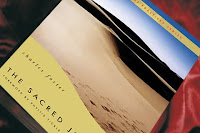 By Dr. Gary E. Gilley
By Dr. Gary E. Gilley
Southern View Chapel

![]()
![]()
This book is part of The Ancient Practices Series, published by Thomas Nelson and edited by Phyllis Tickle. The premise is that pilgrimage is essential to spiritual formation and Foster is seeking to provide answers to three questions:
- How did anyone ever think that a journey, such as a journey made by a barn swallow, had any religious significance?
- Was he right?
- If he was, what should we do with the insight (p. xiii)?
The author attempts to support the view that pilgrims and nomads are superior to city people and civilization in numerous ways:
- Pilgrimage is what is meant by when Jesus said, “Follow Me” (pp. 25, 212).
- Distorting biblical concepts, such as claiming Abel was a tramp while Cain was the founder of civilization (p. 37, 42), and Sodom is what happens when man stops wandering (p. 56).
- Terah, Abram and Lot were hippies (p. 57).
- God is a camper and a hippie (pp. 49, 150).
- Relics are important (pp. 111-113).
- Mythological and ridiculous stories happened on the “sacred journeys” (pp. 163-164; 172-173).
- Jesus was a vagrant tramp (p. xv).
Foster demonstrates that Christian pilgrimage is virtually identical to that of Hindus, Muslims and Buddhists (pp. 6, 18, 70-71, 99, 102, 104, 130-131, 148, 198, 200), and that the idea of reincarnation is superior to the Christian view of one life which ends in death and judgment (p. 161). The author provides numerous stories to try to show the superiority of the life of a pilgrim. The most interesting, and strange, is that of an astrophysics PhD from Princeton who put his civilized life behind him to beg for rice in India (pp. 165-166). Somehow begging for rice is supposedly a better way to live than doing something productive with one’s life. This is the type of convoluted thinking found throughout The Sacred Journey.
This book is hardly worthy of a review. Foster fails at every point in his attempt to answer his own three questions. His twisting of Scripture is unconscionable. His distortion of reality is unbelievable. His conclusions are ridiculous. That Thomas Nelson is willing to publish such rubbish is a sign of how untrustworthy Christian publishing has become. My vocabulary is not large enough to express all the negatives that are found within this silly and godless volume.
- Book Review: 'The Harbinger' by Jonathan Cahn • BPB (Gary Gilley)
- Book Review: Apologetics Study Bible • BPB (Paul Henebury)
- Book Review: The Coming Economic Armageddon - By David Jeremiah • BPB (Jeffrey Camino)
- Book Review: Is 'Heaven Is for Real' for Real?: An Exercise in Discernment • BPB (T. A. McMahon)
- New Evangelicalism: A Review • BPB (Thomas Ice)









